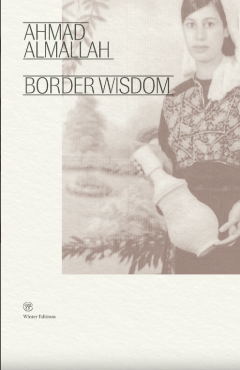Border Wisdom

Ahmad Almallah
2023
Winter Editions
"Reading this book, one comes to understand that one of the most astounding, paradoxical companions to our grief is precision. Via his very syntax, through the intermingling of silence and sigh, Ahmad Almallah creates a sober and tender and bitter account of a journey that is loss—of one’s beloved, one’s land, one’s hope—and, according to his version of events, it is loss that nurtures, disciplines, and gifts the desire of writing."—Polina Barskova
"Border Wisdom reassembles the loss of a mother, mother tongue, and mother land, and gives pain a passage. These poems, like death, disappear and reappear in a different translation. One that’s at the border of language and breath. One that calls on trees for overtures. And out of wood comes word[s]. The Arabic and English become 'windows [that] know something of the hidden world.' These poems are infinite and steadily moving in memory of all that’s gone, and all that will be regained. A piercing collection."—Nathalie Handal
"Ahmad Almallah observes the dust that rises when war and grief collide in the rubble of brief existences made briefer by geopolitical devastations. These poems honor the daily trembling and unexpected questions that accompany the losses of one’s spaces of origin—one’s mother, one’s land, one’s language. I won’t lie and say that it is easy to read this unflinching work, these searing confrontations with the lividity and ferocity of grief. But I admire a poet who is unafraid to rise up and be a pallbearer, who is unafraid to point out the difficulty of holding in our memory what we would rather hold in our arms."—Divya Victor
"While completely blurring the lingual border between Arabic and English and turning the bilingual into an intralingual language of poetry, Almallah offers us a dazzling contemplation on the mother tongue and on transposing that tongue, so naturally, into a second language, making the Arabic of the unconscious glaringly visible on the page, subversively complementing the prevalent English of this poetic Möbius strip."—Antón Shammás
